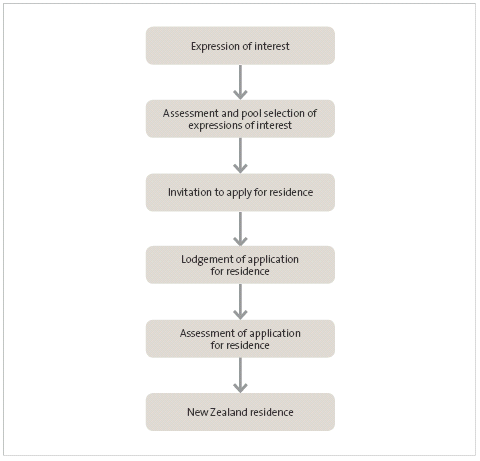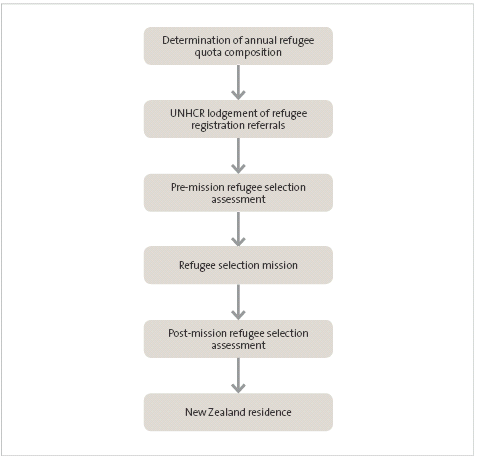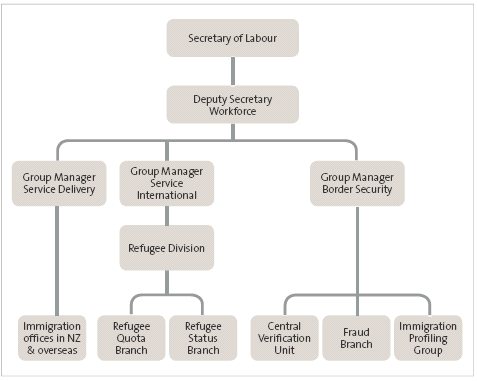Part 2: Background
2.1
In this Part, we describe:
- immigration to New Zealand, including the selection of skilled migrants and UN-quota refugees; and
- the management of immigration identity fraud, including how the Department is organised to manage immigration identity fraud.
Immigration to New Zealand
2.2
Immigration policies aim to build the country’s skilled workforce, facilitate the
entry of students and visitors, reunite migrant families, meet the Government’s
international commitments, and foster regional and bilateral relationships with
other countries.
2.3
People are granted visas and permits for New Zealand under two broad categories,
depending on the nature of their intended stay – temporary or permanent.
2.4
Temporary entry enables people to visit, study, or work in the country for a defined
period. In 2005/06, almost 1.5 million people were issued a temporary permit or
visa.
2.5
Permanent entry enables people to reside in the country under the skilled/
business, family-sponsored, and international/humanitarian streams of the
New Zealand Residence Programme. The total number of people accepted as
part of the programme within these three entry streams is approved annually by
the Government. In 2005/06, a total of 51,236 people were granted permanent
residence.
2.6
Skilled migrants qualify for permanent residence under the skilled/business
stream, and UN-quota refugees qualify under the international/humanitarian
stream. In 2005/06, there were 27,539 people approved through the skilled
migrant category, and 791 people approved through the UN-quota refugee
category.
Selection of skilled migrants
2.7
The aim of the skilled migrant category is to meet the country’s identified labour
market needs and opportunities and contribute to growth and innovation, and
to make and retain links with other countries. Figure 1 outlines the process for
selecting skilled migrants.
2.8
Gaining residence through the skilled migrant category is based on an applicant’s
employability, capacity to contribute skills that New Zealand does not have, and ability to settle and contribute to New Zealand. Applicants must also meet
relevant health, character, and English language requirements. Applicants gain
points for meeting these entry requirements, with a minimum of 100 points
required to register an expression of interest. From December 2005, changes to
the skilled migrant policy gave priority to highly skilled migrants and applicants
with a skilled job or offer of a job in New Zealand.
2.9
Applicants register an expression of interest with the Department. The
expressions of interest are assessed and, if all entry requirements are met,
applicants go into a pool from which some are invited to apply for permanent
residence. The application for residence is then assessed, and, if all entry
requirements are met, New Zealand residence is granted.
Figure 1
Process for selection of skilled migrants

Selection of UN-quota refugees
2.10
The aim of the UN-quota refugee category is to resettle United Nations-mandated
refugees recognised under the 1951 Convention Relating to the Status of Refugees
(the 1951 Convention) and the 1967 Protocol Relating to the Status of Refugees
(the 1967 Protocol), to which New Zealand is a signatory. Figure 2 briefly outlines
the process for selecting UN-quota refugees.
Figure 2
Process for selection of UN-quota refugees

2.11
Since 1987, about 750 UN-quota refugees1 have been accepted for resettlement
each year, in six intakes throughout the year.
2.12
The Department consults the UNHCR, refugee communities, non-government
organisations, and relevant government departments on the composition of
the quota, which is approved annually by the Minister of Immigration and the Minister of Foreign Affairs. The composition is based on nationality, the country
that refugees flee to from their own country, and consideration of the particular
needs of different refugee groups.
2.13
The UNHCR decides which refugees are in the greatest need of resettlement, and
makes recommendations for resettlement in countries such as New Zealand. Although resettlement countries rely to an extent on the integrity of the UNHCR’s
decision-making activities, it is the individual countries that make the final
decision on whether to accept or refuse cases referred to them for resettlement.
2.14
UNHCR referrals to the Department for refugee resettlement come from priority
areas throughout the world where it is deemed that resettlement to a third
country is preferable to voluntary repatriation or integration in the country where
refuge was first sought. The criteria for resettlement in New Zealand is based on
a number of factors, including that the refugee is recognised by the UNHCR as
a refugee under the 1951 Convention and the 1967 Protocol, and is submitted
for resettlement in accordance with UNHCR resettlement guidelines and the
priorities set out in the quota composition.
2.15
Referrals for refugee resettlement are assessed, and candidates are then
interviewed as part of selection missions which the Department carries out
in United Nations refugee camps. Referrals are re-assessed after the selection
missions. If candidates meet all the requirements, they are selected as part of
the annual quota. Arrangements are then made for their travel, reception, and
resettlement to New Zealand. Once UN-quota refugees arrive in New Zealand,
they are granted New Zealand residence.
Managing immigration identity fraud
The importance of identity for immigration
2.16
Accurately identifying a person is the fundamental element in effectively
facilitating the entry of migrants to New Zealand. Confidence in the identity of a
person is essential for immigration purposes because it is the core component of
visa processing and assessment.
2.17
A person using a false identity can pose significant risks to the country, including
financial, terrorism, health, legal, or criminal risks. Also, other government
departments rely on identities accepted as part of visa processing and assessment
to confer entitlements in New Zealand.
2.18
Although the UNHCR carries out its own interviews, checks, and assessments
before referrals for refugee resettlement are made, the Department has indicated
that accurately establishing the identity of UN-quota refugees is difficult, complex, and delicate. This is because most refugees have no documentation with
them, verification of their identity cannot be carried out in their country of origin
because of security risks, and refugees commonly use aliases rather than their
true names. Verification of identify is also difficult because, for many refugees,
family structures are often broken and refugees commonly flee in large numbers,
and as a result United Nations agencies have not been able to thoroughly
establish the relationship between family members.
Immigration identity fraud
2.19
Identity fraud has been recognised as one of the most pervasive developments in
fraud in recent years. The Department has recognised that, with a proliferation of
the narcotics trade, many organised criminal groups use false travel documents
and falsely-obtained immigration status to aid their offending.
2.20
In relation to immigration, identity fraud can involve the use of a false name,
or failure to declare other names a person is known by, in an immigration
application. This is often done to hide historical factors that may have an adverse
effect on the person’s application for entry into New Zealand. For example, an
applicant may have been removed from New Zealand or another country, have
been previously declined refugee status in New Zealand or another country, have
been convicted of a serious crime, or be wanted overseas for human rights abuses.
2.21
Improvements in document forgery and an increase in identity theft have also
led to more opportunities for individuals or organised groups to circumvent New
Zealand’s border controls. The Department has identified an increasing number
of cases of individuals lodging multiple refugee claims under different identities,
and cases of people previously removed from New Zealand who return under false
identities.
2.22
The Department recognises that identity fraud is a major risk to New Zealand. Since August 2005, there have been 257 suspected false identities referred by
the Department to the Police for inclusion in the Police intelligence records,2 and
between 2003 and 2006 there were more fraud prosecutions by the Department
for identity fraud than any other fraud type.
The Department of Labour’s responsibilities for managing immigration identity fraud
2.23
The Department’s responsibilities in relation to immigration include helping
create a high-skilled workforce by attracting and retaining skilled migrants,
maintaining the security of New Zealand borders, assisting migrants and refugees
to resettle, and making decisions each year on visa and entry permit applications.
2.24
Facilitating the movement of people in and out of New Zealand, while protecting
the integrity of the border, requires a balance between making the entry of people
with the appropriate authority as smooth as possible and preventing the entry
of those without the appropriate authority. It also includes the detection and
removal of people in New Zealand who have entered fraudulently.
2.25
The Department plays an important role in minimising the cost of immigration
fraud. It enhanced the border security function within its Workforce Group in
May 2005, after the Budget 2005 allocation of $13 million for border security
initiatives. In Budget 2006, an extra $16 million was allocated over four years
for border security measures to provide additional staff and resources for the
Department’s Immigration Profiling Group.
2.26
The immigration change programme comprises three parts:
- reform of the Immigration Act 1987;
- a review of immigration policy; and
- support for improved service delivery for the Department, through the Immigration Business Transformation.
2.27
Aspects of the immigration change programme that are relevant to the scope of
the audit, and other initiatives such as the Department’s client risk methodology,
are noted in Parts 3, 4, and 5.
How the Department of Labour is organised to manage immigration identity fraud
2.28
The Department’s Workforce Group is responsible for making decisions on visa
and entry permit applications, and assisting migrants and refugees to settle in
New Zealand. Figure 3 outlines the Department’s organisational structure for
managing immigration identity fraud.
2.29
The Workforce Group provides immigration advice and services, including
the management of immigration fraud. Important responsibilities within the
Workforce Group for the management of identify fraud lie within the Service
Delivery, Service International, and Border Security Groups.
2.30
The Service Delivery Group, which consists of Immigration New Zealand3 branch
offices in New Zealand and overseas, is responsible for the processing, verification,
and assessment of skilled migrant applications.
2.31
The Service International Group includes the Refugee Division, which includes
the Refugee Quota Branch and Refugee Status Branch. The Refugee Quota Branch
is responsible for the processing, assessment, and resettlement of UN-quota refugees. The Refugee Cancellation Team within the Refugee Status Branch is
responsible for the cancellation of refugee status, including status approved by
the UNHCR.
Figure 3
The Department of Labour’s organisational structure for managing immigration
identity fraud

2.32
The Border Security Group includes the Central Verification Unit, which is
responsible for verification of skilled migrant applications in the Auckland region,
and the Fraud Branch, which is responsible for all fraud investigations. The Border
Security Group also includes the Immigration Profiling Group, which is responsible
for the processing and risk assessment of skilled migrant applications from highrisk
countries, and risk assessment of all UN-quota refugees.
1: The total annual quota can vary by plus or minus 10%.
2: The Department does not record false identities detected or prosecuted by entry category.
3: Immigration New Zealand is the brand name for the Workforce Group’s immigration branch offices in New Zealand and overseas.
page top
